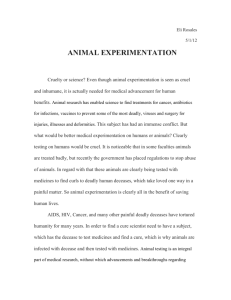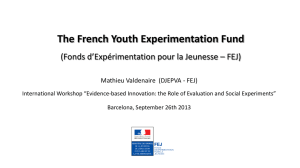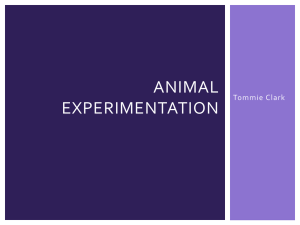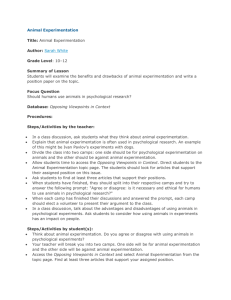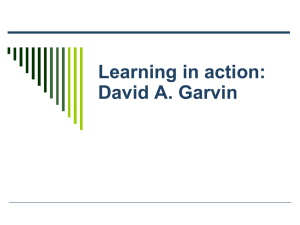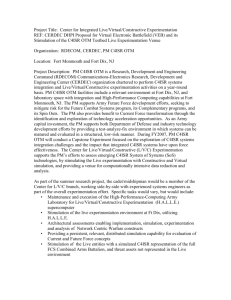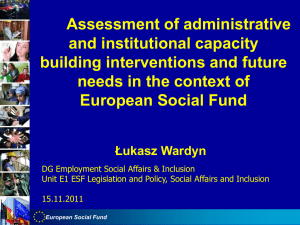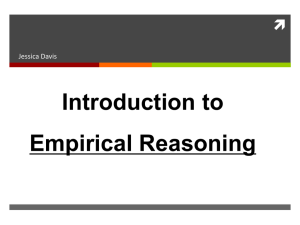ESF and Social innovation and social experimentation
advertisement
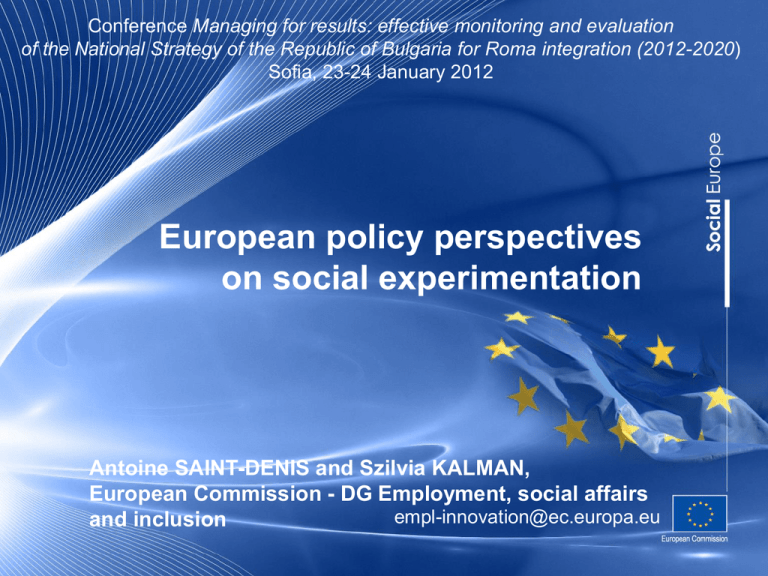
Conference Managing for results: effective monitoring and evaluation of the National Strategy of the Republic of Bulgaria for Roma integration (2012-2020) Sofia, 23-24 January 2012 European policy perspectives on social experimentation Antoine SAINT-DENIS and Szilvia KALMAN, European Commission - DG Employment, social affairs empl-innovation@ec.europa.eu and inclusion What is social experimentation? • Social experimentation relates to testing innovative solutions at small scale and measuring its specific impact on beneficiaries with a view to disseminating them widely. • Social experiments are a more specific tool than mutual learning projects, social innovation projects or pilot projects. • « How to better implement what is designed on paper? » It is an action-oriented tool. 2 What is social experimentation? • Social experimentation uses randomised control groups to evaluate the specific value added of the measure (What would have been the situation of the people if the measure had not been implemented?) Test group Control group comparison Highly robust information about the measure and the context 3 What is social experimentation? • Not experimenting on people, but experimenting on concrete actions in order to assess what works and what does not for the sake of the people • Actors of a social experiment: – Public authorities (policy-makers) – Social service providers – Evaluators – Civil society organisations 4 The policy context • The urgency of more effective and efficient policies: – In the context of the crisis, responding to social needs cannot systematically mean spending more – Need to go on innovating in order to respond to Europeans’ long-term needs and aspirations 5 The policy context • The development of impact evaluation within the EU cohesion funds: – Impact evaluation seminar of the regional policy (Polish Presidency of the EU, Warsaw, 12 December 2011). – Developing counterfactuals are now a priority of DG EMPL and DG REGIO. 6 The policy context • The Europe 2020 Strategy: – Emphasis on promoting innovation and social innovation (flagship initiative Innovation Union) – Focus on reforms of social policies through evidence-based social innovation including social experimentation (flagship initiative European Platform against poverty and social exclusion) 7 The value added of social experiments • At least 4 four types of value added: – starts small but gives a real chance of scale up – Supports decision process by making timely evaluation more useable: repeated interactions between knowledge and action – Helps finding the most efficient solutions: especially when the policy consists in influencing people’s behaviour – builds consensus for reforms: helps to overcome controversy about a policy initiative 8 Examples of social experiments • Amalipe center’s project Promoting social inclusion of young people in marginalised rural Roma communities: – supported by the European Commission (Progress, 2011-2012) – Developing 4 community support centers 9 Examples of social experiments • Worldwide: World Bank and J-Pal (poverty action lab) projects • In the European Union: – The Wroclaw conference (26 September 2011) showcased 10 social experiments implemented in 15 Member States. These projects cover the fields of education, employment, homelessness, minimum income benefit and youth policy 10 EU support action: awareness raising • An EU ministerial conference of the Polish Presidency, held in Wrocław (Poland) on 26 September 2011, discussed responses to the social impact of the crisis and how to intensify the support to innovation within social policies. • Planned EU conference on 29 June 2012 in Brussels • A number of other events 11 EU support action: capacity building J-Pal guide on SE for policy makers (available) EU support network Capacity building ESF learning Network? Training for public authorities … 12 EU support action: financial support €9,5M 2009-11 €5900 M ESF 2007-2013 Financial instruments 2014-2020 ? PROGRESS 2007-2013 EU Programme for Social Change and Innovation 2014-2020 €100M 13 The EC proposal for a Programme for Innovation and Social Change • Article 4 – General objectives (b) Support the development of adequate, accessible and efficient social protection systems and labour markets and facilitate policy reform, by promoting good governance, mutual learning and social innovation • Article 15 – Specific objectives (Progress axis) (c) Provide policy-makers with financial support to test social and labour market policy reforms, build up the main actors’ capacity to design and implement social experimentation, and make the relevant knowledge and expertise accessible • Article 5 – Budget 958 million€ - 60% to the Progress axis, “of which at least 17% shall be allocated to promoting social experimentation as a method for testing and evaluating innovative solutions with a view to scaling them up”. = almost 100 million€ 14 The proposal for the ESF regulation • Article 9 – The ESF shall promote social innovation within all areas falling under the scope of the ESF in particular with the aim of testing and scaling up innovative solutions to address social needs. – MS shall identify themes for social innovation – The Commission shall facilitate capacity building for social innovation (mutual learning, networks, dissemination of good practices and methodologies) • Article 11 – The co-financing rate shall be increased by 10 percentage points if the whole of the priority axis is dedicated to social innovation or to transnational cooperation, or a combination of both – For each priority axis, operational programmes shall describe how they contribute to social innovation, and which allocation of money is made 15 For more information Available online: • A methodological guide to social experimentation • 10 examples of social experiment in 15 Member States http://ec.europa.eu/social/innovationconference 16 For more information • call for proposals on social experimentation (closed 15 Dec 2011): – http://ec.europa.eu/social/main.jsp?catId=630&langId=en&callI d=331&furtherCalls=yes • Multiannual financial framework 20142020: – Cohesion Policy http://ec.europa.eu/social/main.jsp?langId=en&catId=89&news Id=1092&furtherNews=yes – New EU Programme Innovation for Social Change and http://ec.europa.eu/social/main.jsp?langId=en&catId=89&news Id=1093&furtherNews=yes 17

